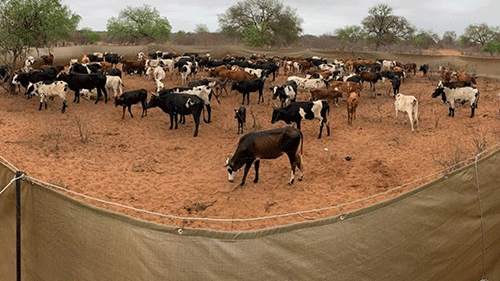A study by the Namibia Financial Institutions Supervisory Authority (Namfisa) concluded a local appetite exists for agriculture index-based insurance in Namibia. This type of insurance was conceptualised to help mitigate adverse weather effects around the world.
Although the concept is not new to the Namibian agriculture industry, Namfisa stated this option carries the potential to serve as a catalyst in promoting financial inclusion in cushioning farmers against adverse weather conditions and in helping to effectively utilise fiscal spending, particularly regarding disaster risk programmes.
Index-based insurance can be defined as insurance designed to protect against shared losses, rather than individual risks, such as area yield index insurance and weather-based index insurance. “To identify the challenges faced by farmers, particularly communal farmers, who do not have access to agriculture insurance products for livestock and crop production risks in Namibia, Namfisa undertook a study to determine the coverage and feasibility of agriculture index-based insurance in the country,” reads the quarterly statistics report for the first quarter of 2022 released by Namfisa. Namfisa noted the study was benchmarked against previous pilot schemes carried out in the country as well as other developing countries that share similar characteristics with Namibia.
In Namibia, the advent of frequent droughts, owing to climatic changes, threatens food security and the livelihood of many Namibians.
This, in turn, has an adverse effect on the agriculture sector’s growth and, thus, impacts the overall Namibian economy.
This is because about 70% of the Namibian population depends on agricultural
activities as a livelihood. Namfisa stated agriculture index insurance in developing countries is usually considered, as it can be used as a tool to promote agricultural and rural development.
It can help households, financial service providers and input suppliers to manage low-to-medium frequency covariate risks, such as drought or excess rainfall.
Index-based insurance can also provide an alternative method of funding disaster recovery assistance or relief programmes.
Essentially, index insurance is designed to protect farmers against risk while keeping costs low. “Payouts are made according to the predicted losses incurred by smallholder farmers, usually based on the index’s correlation with average losses in the area. A physical inspection of the loss area is not necessarily conducted. Frequent droughts, owing to climate change experienced in Namibia, have begun to threaten food sustainability and the livelihoods of many Namibians, particularly the rural community,” the report added.
If no action is taken to adapt to climate change, the preliminary estimates of the impact on natural resources, such as agriculture and marine life, suggest Namibia could lose between 1% and 6% of its gross domestic product.
Agriculture ministry spokesperson Jona Musheko recently said over 97 800 livestock perished between October 2018 and December 2019 as a result of the devastating drought. Musheko added nearly 60% of the deaths reported are cattle, followed by goats (28%) and sheep (11%), while donkeys and horses recorded less than 1%.
Omaheke governor Pijoo Nganate last year said the insurance product is long overdue, adding farmers are struggling and suffering due to livestock losses.
“Many farmers lost their livestock due to the devastating drought and livestock theft in the region – and with this, many of them will be relaxed and their livelihoods will be going ahead,” said Nganate.
While addressing Omaheke inhabitants in August last year, the governor announced farmers in the region last year suffered losses in excess of N$8.8 million as a result of rampant livestock theft.
Nganate added 339 stock theft cases were reported to the region’s police during the last financial year.
Growing interest
The Namfisa bulletin added the insurance industry has shown interest in the development of agriculture index-based insurance, as many of the entities have either conducted pilots in the past or are planning to do so in the near future.
Given this growing interest, Namfisa approached the World Bank to conduct a Technical Assistance Diagnostic Assessment of the preparation progress towards the launching of agriculture index-based insurance, the required infrastructure resources and the government’s role in launching agriculture index-based insurance.
Also, the Namibia Special Risks Insurance Limited last year stated it is conducting a feasibility study for a local agricultural insurance scheme, with the view of later introducing an insurance product for farmers. Its feasibility study is aimed at understanding and assessing farmers set up in rural Namibia, their level of understanding related to risks associated with crop losses, their preparedness and contingency planning in the events of long dry spells, and crops being destroyed due to pests and diseases.
- mndjavera@nepc.com.na


